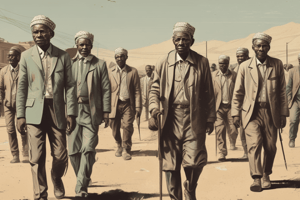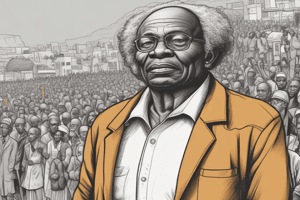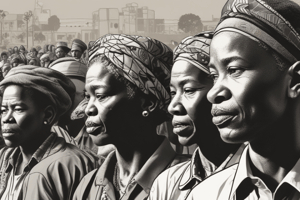Podcast
Questions and Answers
Who led the fight against apartheid in South Africa?
Who led the fight against apartheid in South Africa?
What is the current major issue in South Africa's economy?
What is the current major issue in South Africa's economy?
Which party was formed in 2013 in South Africa?
Which party was formed in 2013 in South Africa?
What is the name of the commission that investigated state capture in South Africa?
What is the name of the commission that investigated state capture in South Africa?
Signup and view all the answers
Which of the following is NOT a major challenge facing South Africa's education system?
Which of the following is NOT a major challenge facing South Africa's education system?
Signup and view all the answers
What is the name of the international organization that South Africa is a part of?
What is the name of the international organization that South Africa is a part of?
Signup and view all the answers
What is the main issue surrounding land reform in South Africa?
What is the main issue surrounding land reform in South Africa?
Signup and view all the answers
Who is the current president of South Africa?
Who is the current president of South Africa?
Signup and view all the answers
Study Notes
South African Political Landscape
Post-Apartheid Era (1994-present)
- Transition from apartheid to democracy, led by Nelson Mandela and the African National Congress (ANC)
- Adoption of the Constitution of South Africa (1996) and the Bill of Rights
Political Parties
Ruling Party: African National Congress (ANC)
- Founded in 1912, led the fight against apartheid
- Dominant party in South African politics, holding power since 1994
- Current president: Cyril Ramaphosa
Opposition Parties
- Democratic Alliance (DA): formed in 2000, led by Mmusi Maimane
- Economic Freedom Fighters (EFF): formed in 2013, led by Julius Malema
- Inkatha Freedom Party (IFP): founded in 1975, led by Mangosuthu Buthelezi
Contemporary Issues
Economy and Inequality
- High unemployment rates, particularly among youth
- Persistent income inequality and poverty
- State-owned enterprises (SOEs) and corruption
Corruption and State Capture
- Allegations of corruption and state capture under former President Jacob Zuma
- Commission of Inquiry into State Capture (2018-2020)
- Reforms aimed at strengthening institutions and fighting corruption
Land Reform and Expropriation
- Land restitution and redistribution efforts
- Debate around land expropriation without compensation
- Constitutional amendments and policy changes
Education and Healthcare
- Challenges in education, including infrastructure and teacher shortages
- Healthcare system struggles, including funding and access to care
- National Health Insurance (NHI) reform initiatives
Foreign Policy and International Relations
- South Africa's role in regional and international organizations (e.g., AU, BRICS, UN)
- Diplomatic relations with global powers (e.g., USA, China, EU)
- Trade agreements and economic partnerships
South African Political Landscape
Post-Apartheid Era (1994-present)
- Transition from apartheid to democracy led by Nelson Mandela and the African National Congress (ANC)
- Adoption of the Constitution of South Africa (1996) and the Bill of Rights, which enshrines human rights and freedoms
Political Parties
Ruling Party: African National Congress (ANC)
- Founded in 1912, played a key role in the fight against apartheid
- Dominant party in South African politics, holding power since 1994
- Current president: Cyril Ramaphosa, who has been leading the party since 2017
Opposition Parties
- Democratic Alliance (DA): formed in 2000, led by Mmusi Maimane, known for its liberal policies and stance against corruption
- Economic Freedom Fighters (EFF): formed in 2013, led by Julius Malema, a radical left-wing party with a focus on economic empowerment
- Inkatha Freedom Party (IFP): founded in 1975, led by Mangosuthu Buthelezi, a party with a strong presence in KwaZulu-Natal
Contemporary Issues
Economy and Inequality
- High unemployment rates, particularly among youth, with a rate of around 55% in 2020
- Persistent income inequality, with a Gini coefficient of around 0.63
- Poverty affects around 30% of the population, with the majority being black Africans
- State-owned enterprises (SOEs) and corruption are major challenges, with SOEs facing financial and operational difficulties
Corruption and State Capture
- Allegations of corruption and state capture under former President Jacob Zuma, including the Gupta family's influence
- Commission of Inquiry into State Capture (2018-2020) led by Justice Raymond Zondo, which uncovered widespread corruption
- Reforms aimed at strengthening institutions and fighting corruption, including the establishment of the Investigating Directorate
Land Reform and Expropriation
- Land restitution and redistribution efforts, with a focus on addressing historical injustices
- Debate around land expropriation without compensation, with some advocating for it as a means to address inequality
- Constitutional amendments and policy changes aimed at accelerating land reform, including the establishment of the Land Reform Advisory Panel
Education and Healthcare
- Challenges in education, including infrastructure backlogs, teacher shortages, and poor educational outcomes
- Healthcare system struggles, including funding shortages, staff shortages, and access to care challenges
- National Health Insurance (NHI) reform initiatives, aimed at achieving universal healthcare coverage
Foreign Policy and International Relations
- South Africa's role in regional and international organizations, including the African Union (AU), BRICS, and the United Nations (UN)
- Diplomatic relations with global powers, including the United States of America, China, and the European Union
- Trade agreements and economic partnerships, including the African Continental Free Trade Area (AfCFTA) and the South African-European Union Trade Agreement
Studying That Suits You
Use AI to generate personalized quizzes and flashcards to suit your learning preferences.
Description
This quiz covers the transition from apartheid to democracy in South Africa, led by Nelson Mandela and the African National Congress, as well as the country's political parties and leaders.




